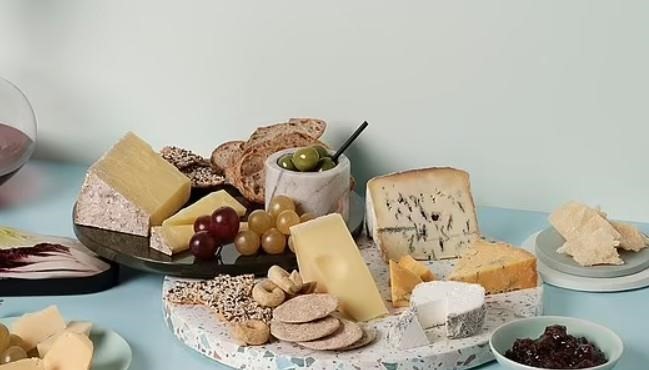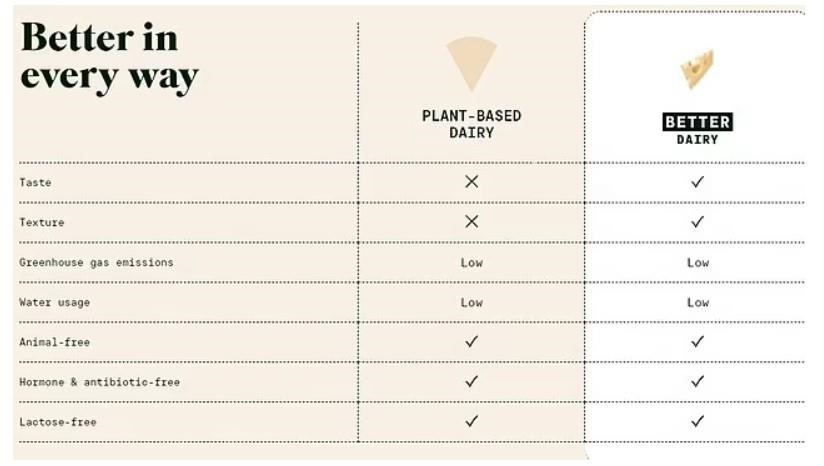A UK start-up is set to launch a cheese that’s made from milk – without using any cows.
Better Dairy is making the snack that under the microscope will be indistinguishable from the real deal.
The new type of milk isn’t produced from cows or goats but can have the same biochemical structure – and taste – thanks to an emerging field of biotechnology known as ‘precision fermentation’.
Companies backing the new product say it is more sustainable and has less environmental impact when compared with traditional dairy farming.
Instead of the milk coming from a cow, it will grown from yeast.
The yeast will be fed sugar, which can then be converted into milk proteins, in a process that is similar to brewing beer, reports the Economist.

Better Dairy is making the snack that under the microscope will be indistinguishable from the real deal (pictured)
According to Better Dairy’s website, the company will use precision fermentation to create a casein (the protein usually found in milk), that is completely animal free.
After brewing it, the casein will be added to plant-based fats, sugar and minerals.
Currently, the company is still using a bovine casein but is developing a synthetic version.
‘Casein is the thing that gives cheese its melt, its stretch, its gooey-ness,’ CEO Jevan Nagarajah told Sky News.

These say it has the taste and texture of traditional dairy – but is still environmentally friendly
‘And so with just casein you are 90 per cent of the way towards traditional cheese.’
It is also currently very costly, one fermenter – which can produce around 30 litres of milk a day, cost £150,000 while a cow cost around £1,600.
Perfect Day, a company based in the United States, is already making the animal-free protein from microflora, which is being used in commercial products like ice cream, milk and protein powder.
Consumers have already embraced traditional plant alternatives to dairy milk in recent years with soy, almond, rice and oat milks taking up increasing shelf space.
What is precision fermentation?
The new ‘synthetic milk’ is not a plant-based alternative like oat or almond milk but rather is chemically identical to regular dairy milk.
Micro-organisms, such as the thread-like mycelium fibres of mushrooms, are programmed in a lab to produce specific complex molecules such as proteins at very cheap cost.
The organisms are given nutrients such as sugar and then allowed to ferment where they produce the desired proteins.
These proteins are then collected, purified, flavoured and packaged into food products.
The end product’s chemical composition is identical to traditional products.
Any type of new food ingredient needs approval from Food Standards Australia New Zealand with no application as yet for this product.
Oat milk, in particular, has skyrocketed in popularity across the globe with one of the biggest players, Swedish company Oatley, being valued at $13billion in May.
Currently, vegan alternatives are often made using plant oils that are high in saturated fat and bad cholesterol and void of any vitamins or minerals.
Eating too much could raise the risk of heart disease and other health problems, like weak bones, according to nutritionist Richard Hoffman, from Hertfordshire University.
He said many people expect the vegan substitute to be ‘as nutritious as dairy cheese’.
‘But because many manufacturers are focused on making the cheese taste, look and even melt like dairy cheese, this is rarely the case,’ he warned.
The number of vegans in the UK quadrupled to 600,000 between 2014 and 2019, according to the Vegan Society.
Dozens of alternative cheeses are now available in supermarkets as a result, including those made by Applewood, Sheese, Vitalite, Violife and Ilchester Vegan.
They can cost more than twice as much as traditional versions.
Starch and vegetable oils — such as coconut oil and palm oil — are the main ingredients in vegan cheese and make them resemble the real thing.
But these have ‘little nutritional value’, Mr Hoffman said in The Conversation.
The gut breaks down starch into sugar, with too much leading to weight gain, type 2 diabetes and heart disease.
And vegetable oils are ‘even worse’, as despite claims that coconut oil is healthy, it is ‘almost entirely’ saturated fat, he said.
Lauric acid, the main type of saturated fat in coconut oil, pushes up levels of ‘bad cholesterol’ known as low-density lipoprotein (LDL). This can increase the risk of heart disease.
Just one small 30g portion of coconut oil-based vegan cheese can contain a third of a person’s daily saturated fat allowance.
However, vegans can fare slightly better by consuming plant-based cheddar that uses palm oil.
Around half of the fat in palm oil is saturated, compared to 90 per cent in coconut oil. But palmitic acid, the main saturated fat in palm oil, also drives up the risk of heart disease.
While the real thing is also high in saturated fat, it is not linked to a high risk of heart disease.
Scientists believe this may be down to the saturated fat occurring naturally in cheese not being absorbed by the body as much as those in oils and meats.
Those eating vegan cheese may also miss out on the nutritional benefits of dairy cheese, which naturally contains protein, calcium, iodine, vitamin B12 and vitamin D.
Source : uconn.edu